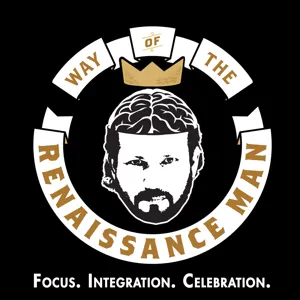Podcast Summary
The Enlightenment's Enduring Impact: The Enlightenment's ideas of rationalism and rejection of superstition continue to shape modern society, with ongoing debates and divisions.
The ideas of the Enlightenment era, characterized by rationalism and a rejection of superstition, continue to shape and divide the world today. The Capital One Venture X Card offers travel benefits and rewards, while Kroger brand products promise quality at affordable prices. In the podcast "Step You Should Know," the hosts discussed the Enlightenment, emphasizing its ongoing impact on modern society and the ongoing debates and divisions it has engendered. Despite the vast amount of literature on the subject, the enlightenment's influence remains a topic of ongoing intellectual discourse.
Age of Reason and Enlightenment: The 18th century marked a period of intellectual, philosophical, and cultural change, characterized by the dominance of reason, the rise of the people's will, and significant economic shifts. Figures like Isaac Newton led the way in challenging traditional thinking and promoting rational inquiry.
The Enlightenment was a period of profound intellectual, philosophical, scientific, and cultural change that began in the 18th century. It marked the domination of reason over religious dogma, the rise of the will of the people over monarchy, and significant economic changes. The Enlightenment occurred in various parts of Europe and the American colonies, and its impact is still debated. Some see it as a necessary step forward, leading to the Industrial Revolution and the American experiment. Others lament the loss of religious influence. Key figures like Isaac Newton contributed to the Enlightenment's foundation by challenging traditional ways of thinking and encouraging rational inquiry. The debate continues today about the extent to which the Enlightenment went too far in abandoning religion.
The Age of Enlightenment challenged religious dominance with curiosity about the natural world and secular thinking.: The Age of Enlightenment marked a shift from theological dominance to reason and individualism, sparked by curiosity about the natural world and weakened power of religious institutions.
The intellectual and political shifts during the Age of Enlightenment marked a significant departure from theological dominance. Isaac Newton's observation about gravity sparked curiosity about the natural world, challenging the prevailing religious beliefs. Simultaneously, the 30 Years War weakened the power of the Roman Catholic Church, establishing the precedent of citizens' allegiance to the state over religious institutions. This period saw the emergence of secular thinking and the importance of reason and individualism. Additionally, the so-called "Dark Ages," a term often used disparagingly by pro-Enlightenment thinkers, were not as intellectually stagnant as portrayed. Scholars like Thomas Aquinas contributed to the development of scholasticism, paving the way for future scientific discoveries.
The Middle Ages: A Time of Intellectual Shift and Conflict: During the Middle Ages, scholasticism led to the study of nature, Aristotle's works were translated, and humanism emerged. However, this focus on human achievements and scientific discoveries clashed with the Church's beliefs, leading to resistance against pioneers like Copernicus, Galileo, and Kepler.
The Middle Ages marked a significant shift in European intellectual history, with scholasticism encouraging the study of nature to better understand God and improve oneself. This period also saw the translation of Aristotle's works into Latin, making Greek rational thought accessible to the West and leading to the Renaissance and humanism. Humanism emphasized the value of human abilities and the exploration of the human condition. However, this focus on human achievements and scientific discoveries clashed with the Church's geocentric universe beliefs, leading to criticism and resistance. Pioneers like Copernicus, Galileo, and Kepler faced backlash for challenging the Church's views on the cosmos, as they proposed an infinite universe and elliptical planetary orbits. This tension between religious beliefs and scientific discoveries marked a pivotal moment in history.
Intellectual and Political Challenges to the Church during the Scientific Revolution: The Scientific Revolution marked the decline of the Church's power, with figures like Galileo and Bacon making groundbreaking discoveries, advocating for experimentation and individual rights, leading to the formation of societies through a social contract.
The Church's power was waning during the Scientific Revolution, leading to intellectual and political challenges. This period saw figures like Galileo and Francis Bacon making groundbreaking discoveries, with Galileo recanting his heliocentric theory under threat of heresy. Bacon is known as the father of the scientific method, advocating for experimentation to explain phenomena. Meanwhile, philosophers like Descartes and later thinkers such as Locke contributed to the Enlightenment idea that individuals have natural rights, leading to the formation of societies through a social contract where individuals relinquish certain rights for the greater good. These intellectual and philosophical advancements set the stage for the scientific and political developments of the modern world.
The Power of Education and Experiences to Shape Minds: From historical salons to modern apps, education and experiences can shape our minds, ensuring safety for kids online and empowering individuals with knowledge and financial growth.
Our experiences and education shape our minds, not inherent traits. This idea was championed by French intellectuals like Voltaire during the Enlightenment. In a time when sharing radical ideas was risky, they held private gatherings called salons to discuss new ways of thinking. Fast forward to today, we face a different challenge: ensuring children's safety in the digital world. Zigazoo, a social network for kids, offers a solution. Despite my initial skepticism, I've come to appreciate its features, such as moderated content, parental consent, and absence of comments. It's a space designed prioritizing data safety for kids, even earning Kids Safe COPPA Certification. Another important lesson from history is the power of education and the impact it can have on individuals and society. Just as Voltaire was influenced by the Enlightenment ideas, we too can be influenced by the knowledge and experiences we gain. Investing, much like education, requires careful consideration and the right tools. Betterment, an automated investing and savings app, can help make your money work for you while you relax. It offers high yield cash accounts, diversified portfolios, and tax-efficient strategies. In essence, education, whether it's through historical ideas or modern tools, has the power to shape our minds and improve our lives. Whether it's through private salons or innovative apps, we can continue to learn and grow.
Age of Enlightenment's Impact on Power Structures: The Age of Enlightenment challenged power structures, leading to instability but also paving way for fundamental change, as seen today with social media and erosion of traditional allegiances.
The Age of Enlightenment challenged the power structures of monarchies and religious institutions, leading to periods of instability and upheaval. Today, we're experiencing another wave of enlightenment, driven by social media and the erosion of traditional allegiances to states. This can lead to a less stable world, but also paves the way for fundamental change. The salons of the Age of Enlightenment, where philosophers like Rousseau, Diderot, Voltaire, and Montesquieu gathered, are a reminder of the transformative power of open intellectual discourse during times of change.
Intellectual and Political Revolution in Europe: The Age of Enlightenment, marked by skepticism towards the church and monarchy, led to radical ideas, birth of modern atheism, and the foundation of democratic values through figures like Voltaire and Montesquieu. France emphasized arts, England focused on science and economics.
The Age of Enlightenment was a period of intellectual and political upheaval, marked by skepticism towards the established church and monarchy. Figures like Voltaire and Montesquieu challenged the status quo, advocating for separation of powers and individual freedoms. This thinking paved the way for the seeds of democracy. The French Salons, in particular, were hotbeds of radical ideas, leading to a growing hostility towards religion and the birth of modern atheism. Meanwhile, different parts of Europe saw varying emphases during this period - in France, the arts flourished, while in England, there was a focus on science and economics, as evidenced by Adam Smith's "Wealth of Nations." Overall, the Age of Enlightenment was a transformative time that laid the groundwork for many modern societal values.
Ideas of Adam Smith and David Hume on Limited Government Role in Economics: During the Enlightenment era, Adam Smith and David Hume advocated for limited government intervention in economics, emphasizing the 'invisible hand' of the market to guide principles. This laissez-faire economic theory influenced rulers like Catherine the Great and Frederick the Great.
According to Adam Smith and David Hume, the role of government in economics should be limited, allowing the "invisible hand" of the market to guide principles. This idea, known as laissez-faire economics, holds that legitimate governments are those that do not interfere in people's affairs and let free trade take place. Hume, an empiricist philosopher, emphasized the importance of cause and effect based on previous experience, and both he and Smith's ideas were influential during the Enlightenment era. Despite resistance from the establishment, some rulers like Catherine the Great of Russia and Frederick the Great of Prussia embraced these progressive ideas.
Age of Enlightenment: Radical Thought and Intellectual Exploration: The Age of Enlightenment, marked by philosophers like Voltaire, Kant, and Rousseau, challenged traditional beliefs and led to the American and French Revolutions, shaping modern thought and political structures, despite varying outcomes
The Age of Enlightenment was a period of radical thought and intellectual exploration, marked by philosophers like Voltaire, Immanuel Kant, and Jean-Jacques Rousseau. These thinkers challenged traditional beliefs and advocated for individual freedom and moral absolutes. Their ideas led to the experiments in democracy through the American and French Revolutions, which had varying outcomes. While the American Revolution is often celebrated as a successful establishment of democratic principles, the French Revolution resulted in chaos and violence, leading to the deaths of thousands and the perceived failure of the Enlightenment ideals. The debate over moral absolutism versus relativism continues to be relevant today. Ultimately, the Age of Enlightenment was a pivotal time in history that shaped modern thought and political structures.
The Age of Enlightenment's complexities and debates: The Enlightenment, while promoting reason and individual freedom, also had limitations and unintended consequences, leading to debates about its true intentions and ongoing relevance today.
The Enlightenment, while bringing about important ideas of rational thought and individual freedom, also had its limitations and unintended consequences. The Age of Enlightenment, which challenged religious orthodoxy and promoted reason and humanism, eventually gave way to Romanticism and criticisms of its extreme rationalism. Some argue that the Enlightenment's emphasis on civilization and rational thought led to colonialism and imperialism, going against its intended values. Additionally, the Enlightenment's ideas became dogmatic in their own right, leading to debates about its true intentions and whether it has been fully realized. The ongoing discussions and debates around the Enlightenment's impact highlight the complexity of this historical period and its continued relevance today. For further reading, consider checking out "The Trouble with the Enlightenment" by Ollie Cusson on Prospect magazine and other works by historians such as Jonathan Israel and Anthony Pagden.
Origins of Mad Cow Disease? Mummies as Fertilizer?: The Enlightenment emphasized reason, individualism, and skepticism towards tradition. Darren's theory on Mad Cow Disease's origins, though unproven, underscores the importance of considering unusual connections and questioning established beliefs.
The Enlightenment was a period of intellectual awakening in Europe, marked by a focus on reason, individualism, and skepticism towards tradition. A listener named Darren from Seattle shared an intriguing theory on the potential origins of Mad Cow Disease. He hypothesized that the practice of using ground-up mummies as fertilizer in the late 18th and 19th centuries could have led to the contamination of grass fields, which cows then consumed, leading to the development of Mad Cow Disease. This theory, while unproven, highlights the importance of considering unusual connections and possibilities in scientific inquiry. Additionally, the discussion touched on the importance of critical thinking and questioning established beliefs, which are key aspects of the Enlightenment mindset. If you're interested in learning more about the Enlightenment or have thoughts on Darren's theory, feel free to reach out to the show.






